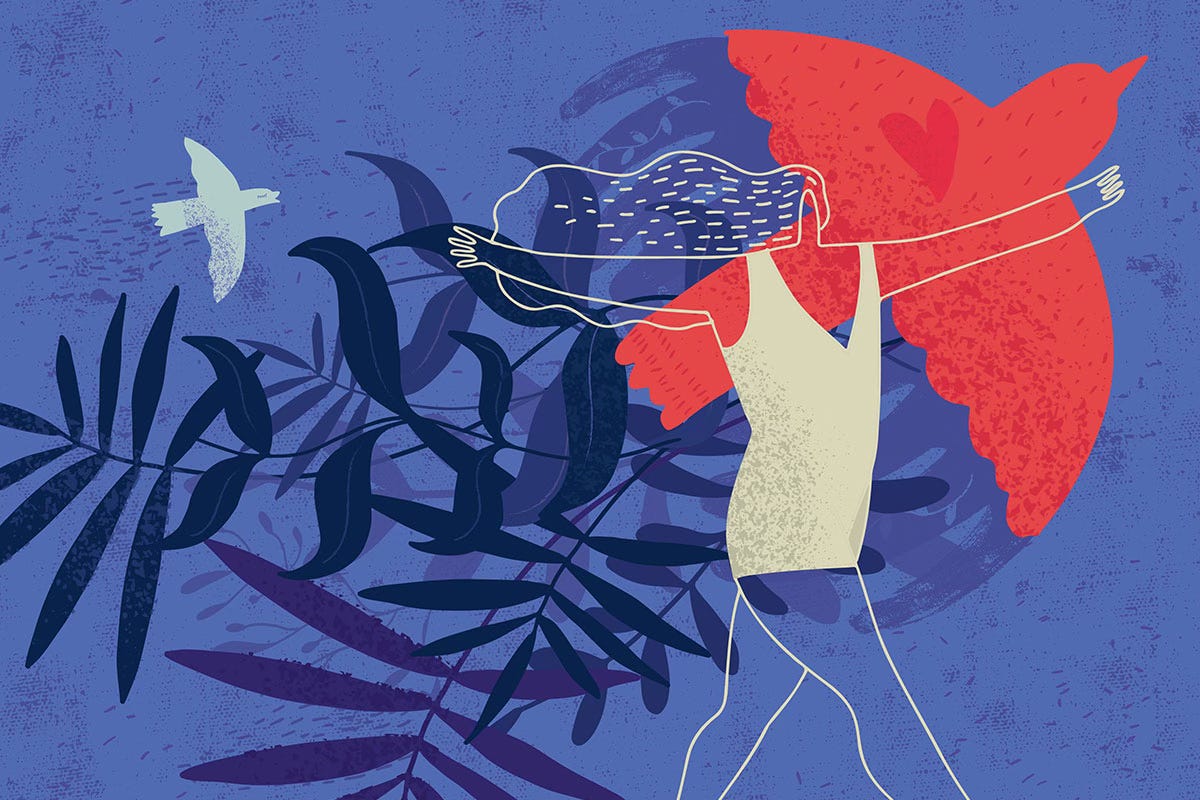Permission to exist as yourself: The greatest gift you can give
How a late autism diagnosis in perimenopause helped me release self-blame and finally feel like myself.
I spent most of this past year feeling like I’d misplaced myself. Not just my keys or wallet, though I definitely lost those too.
Me.
My mind felt foggy and detached, like I was experiencing my life, only in someone else’s body. I cried at the drop of a hat, mixed up times and appointment dates (even parties I wanted to attend!), forgot the names of words I was searching for, and eventually gave up, because it just took too much energy.
Perimenopause symptoms, it turns out, can begin even before your first missed period.
Layered on top of the biological chaos was a deeper identity loss.
After decades of being the breadwinner through my first marriage and into single motherhood, I’d finally found stability in a new, supportive partnership. That gave me the space to step back from the demands of full-time work and shift into a less-harried, part-time contract life. For the first time, I could be a more present mother, prioritize family, take on a few clients, and still focus on my own writing. But it was messy. I was struggling with this new identity.
Who was I if I wasn’t the successful, career-focused woman?
If I could have slid, easy as pie, into my writing, maybe I could have gotten past it. But in the overwhelm of brain fog, even that wasn’t enough.
The lowest point came when I decided to quit all work that wasn’t in service of my writing, only to find the words had dried up.
I blamed myself, of course.
It had been my default for years.
When things go wrong, socially, emotionally, professionally, I trace the problem straight back to me.
I’m the one who makes it weird. I’m the reason people drift away. I’m too much, or not enough, or both, depending on the day.
By this summer, I was deep in my own misery, feeling lost and rudderless, the closest I’d ever come to depression. What finally pulled me out was another D-word: diagnosis.
The diagnosis was level 1 autism. This wasn’t my first round of neuropsych testing. Last year, I went through a battery of tests and came away with inattentive ADHD, a label that never really fit and was what helped me realize I was actually in perimenopause. My husband kept pushing me to get a second opinion. So I did another round of testing early this summer, and that’s when I got the diagnosis that fit.
I’ve always known I was different.
Honestly, I’ve felt it my whole life. I used to see it as a good thing. I seemed to care more. I said the things other people wouldn’t. I was willing to have the conversations other people couldn’t.
But as I got older, especially in leadership roles where interpersonal dynamics and the ability to communicate are everything, the differences became harder to ignore. I saw those differences as flaws. I assumed I was the problem. The reason for misunderstandings. The awkwardness. The social gaffes. The lack of closeness in certain situations. The loss of friendships. I was the common denominator, so I carried the blame.
Not anymore.
A few days ago, my husband brought up the turnaround he’d seen in me since summer. He asked what had changed. The answer was simple: the diagnosis.
It didn’t change my circumstances, but it shifted my perspective. There was a huge weight lifted off me. I wasn’t just being difficult, tone deaf, or standoffish. (Or maybe I was, but now, at least, I had a reason.)
I wasn’t broken. I was just wired differently. And that felt like relief.
And strangely enough, the diagnosis gave me more room to breathe.
There’s a lightness to my being now. The pressure’s off.
Yes, I’m still me. Still intense, still overthinking, still worrying about how I come across more than I need to, but I don’t carry the same shame. I don’t immediately jump to “I must’ve screwed up” when something feels off in a conversation. Even when I do, and even when I did, I have far more grace for myself.
And let me be clear: this isn’t about absolving myself of accountability. I’m still responsible for how I show up in the world. I still have to own my mistakes and the harm I cause.
But now I understand why I show up the way I do.
What I used to think of as a flaw is just a different kind of wiring. It’s not broken. It’s just different.
It’s changed how I see other people too. I recognize kindred spirits now, people who seem a little out of sync, who move through the world differently. I feel more appreciation for them. I used to assume their discomfort was a reflection of me. Now I know it almost never is.
This permission to just be who I am feels like the greatest gift I’ve given myself.
And I don’t think it’s a coincidence that this shift, and my diagnosis, happened during perimenopause.
There’s something about perimenopause and this stage of life that strips everything down to the essentials. For so many of us, it’s the first time we stop living for everyone else. The people-pleasing fades. The perfectionism loosens its grip. We start to ask: What do I actually want? Who am I when I’m not trying to meet everyone else’s expectations?
It’s not always graceful. Sometimes it’s a mess. But underneath it all is realness: we finally start to feel like we can exist as ourselves.
It wasn’t all the diagnosis.
Yes, some of the perimenopausal symptoms have eased.
Or maybe, the further we move through perimenopause, and it becomes the new normal, the less clearly we remember the person we were before.
Sleep is easier. I haven’t lost anything lately. I haven’t accidentally gotten a date wrong in weeks.
I’m writing again, and I think I’ve turned a corner.
I’ve let go of a lot of the work-related identity hangups, especially now since work as we know it feels increasingly tenuous.
Basically, I’m learning to chill out, to soften, to relax into who I am now.
Diagnosis or not, so many of us are craving this kind of permission.
Especially as we head into the most pressure-filled season of the year, with its endless to-dos, obligations, and emotional landmines.
If you’re feeling the weight of expectation, yours or other people’s, what would it feel like to just lower it?
All of it.
The pressure to perform.
To please.
To host the perfect dinner.
To show up as the most polished and put together version of ourselves.
What if we just let some of it go? Even 10 percent less?
I know sometimes we can’t. Sometimes, in certain situations, with certain people, it’s not safe to let our guards down. But when we can, when it’s safe, when it’s just pushing back against the usual narrative, why not?
Not to be selfish.
But to be honest.
To be more real.
To be more us.
Now it’s your turn. I’d love to hear what you’re learning to let go at this stage in your life.
And if you’re sitting with some of this, here are a few questions to ask:
What identities have you outgrown, even if they once defined you?
What would “permission to be yourself” look like in reality, not just theory?
As we move into the most demanding season of the year, how are you taking a load off?
Let’s talk in the comments.








One of the most important and rewarding things I learned (way before perimenopause but still) is that no is a complete sentence. And I use it often. Also, getting go of the word "should" is hugely freeing. I want to, I will, I get to, I won't...always better options.